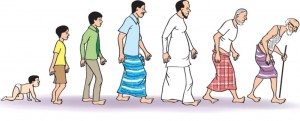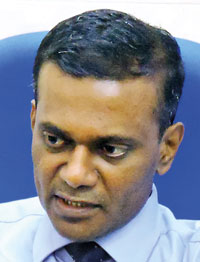Caring for the elderly has to be holistic
Did you know that the elderly who pop a handful of pills, four or more medications, are more likely to become victims of a fall?
This is just one of the many crucial issues that the elderly, with vulnerability to several illnesses, face……..and this is the very reason their care should be coordinated and holistic.
 Such care is now being provided worldwide by Geriatricians, for the young and the old cannot be treated in a similar manner. Even though in countries such as Sri Lanka geriatrics is a relatively new field, the concept had been thought of way back during the Classical Period of Greece by none other than Hippocrates, traditionally considered the ‘Father of Medicine’.
Such care is now being provided worldwide by Geriatricians, for the young and the old cannot be treated in a similar manner. Even though in countries such as Sri Lanka geriatrics is a relatively new field, the concept had been thought of way back during the Classical Period of Greece by none other than Hippocrates, traditionally considered the ‘Father of Medicine’.
Before dwelling on his specialty, Consultant Physician and Geriatrician, Dr. Chandana Kanakaratna gives MediScene a glimpse of the long road travelled by geriatric medicine to reach the milestones of today. (See box)
Reluctant to categorize an age denoting the ‘geriatric’ group, he explains that the aging process which leads to a decline in body functions could come about at a different age in different people. The aging process, in fact, kicks in early and continues throughout life but how fast or slow it occurs would be dependent on each individual’s habits including diet, exercise, whether a smoker, takes alcohol, the illnesses he/she is grappling with, his/her disabilities and also the toxins that the person has been exposed to, MediScene learns.
Therefore, when and how ‘aging’ occurs would be based on multiple factors. As such geriatric medicine focuses on the aging process rather than the age. “We are more concerned about the ‘biological age’ as opposed to the ‘chronological age’,” he is quick to point out. Biological age is how old a person seems, while chronological age is the actual time a person has been alive.
“Geriatric medicine differs from usual medicine. As we grow older, the organs within our body, which ensure the smooth running of our systems – cardiovascular, respiratory, nervous etc — decline. This will impact on simple stuff like our balance, walking and cognition. These highlight key issues in a person’s life,” says Dr. Kanakaratna.

Dr. Chandana Kanakaratna
These could be affected due to:
External stress such as an infection, a stroke or a heart attack. In such cases, in addition to primary organ systems getting affected (an infection could involve the lung and respiratory system; a stroke, the brain and the nervous system; and a heart attack the heart and the cardiovascular system), in the elderly there could also be secondary manifestations which could easily lead to a misdiagnosis. These could come in the form of losing balance, struggling to walk, confusion and loss of bladder and bowel control.
Comparing the young and the elderly, Dr. Kanakaratna explains that once the primary problem is dealt with in young people, the secondary systems correct themselves. However, it is not the same in the elderly, as their body systems may not be able to correct themselves on their own.
Although the infection is treated in the elderly, the secondary systems do not get back to normal and the person continues to be ill.
Citing another example, he says that “only a break of a bone” in a younger person could become a life-changer in an older person if the secondary issues persist. This could easily result in an elderly person, even after the bone is fixed, losing mobility and ending up bed or wheel-chair bound.
This is why it is important to look into this aspect.
Underscoring that as we age, there are important factors which we need to take into account, this Geriatrician lists them as:
Multiple diseases such as diabetes, hypertension (high blood pressure), cholesterol etc.
Poly-pharmacy
Being more susceptible to infections and cancers
The condition of mobility (walking) and stability (balance)
Multiple-sensory impairment – hearing and vision. Sometimes the elderly may seem confused but it could be due to not being bale to hear or see. This is an overlooked area.
Incontinence – bladder and bowels
Mental health – is the memory-impairment due to old age or dementia? There could also be hidden or masked issues such as depression and anxiety. Have there been tell-tale signs that behind the smiling and laughing of an elderly person, there is a mental health problem?
Dental issues – the inability to eat because of bad teeth or lack of teeth
Malnutrition – is the elderly person having enough nutrition? Just because he/she may be eating a large portion of rice, it may not be a balanced diet with all the essentials including vitamins and minerals.
Bereavement – has he/she suffered the loss of a loved one and what has been the impact?
Palliative care – if suffering from terminal illness such as cancer or end-stage heart, liver, kidney disease, the need to keep him/her comfortable and pain-free.
End-of-life care – Although this overlaps the palliative care aspect, there needs to be a look at this to make them comfortable, not do something harmful and recognize those who are dying. This would also apply to communicating with the family and preparing them for what is inevitable. Should the patient be given nutrition to keep a tiny flame of life alive, should he/she be put on a ventilator, should not all invasive procedures halted. Has the patient been guided in the direction of writing a last will.
Ethical issues – Is an elderly patient being physically, sexually, psychologically or financially abused?
This is why an elderly patient needs to be under the ‘coordinated care’ of a Geriatrician who works with a multidisciplinary team including other specialists and therapists to ensure his/her wellbeing. The team, according to him, could involve anybody and everybody – physio and occupational therapists, dieticians, social workers and vitally family members.
Then the Geriatrician would look into the needs of multiple diseases and whether poly-pharmacy is essential. Pointing to the dangers of an elderly patient who is swallowing heaps of tablets and medications, more than just four, Dr. Kanakaratna reiterates that he/she is at increased risk of falls. As the coordinator of the elderly patient, the Geriatrician would gauge pre-morbidity life, assess the current issues and be the ‘triage doctor’.
One of the most obvious dangers the elderly face are falls and fear of falls. In the elderly, a fall is more than a fall for it take away their independence and would sometimes takes years for them to get back to a semblance of their earlier lives.
Dr. Kanakaratna, meanwhile, also talks of an elderly patient who came to see him in a wheelchair. When asked, he said that he could not walk. However, when assisted, he did stand up with help and walk but with the entreaty “don’t let me fall”. Having had a fall five years before, what ailed him and his relatives was the ‘fear of falls’ which is as bad as the fall and had kept him in a wheelchair for five years.
When a person has a fall, the causes for the tumble need to be ascertained, he says, putting forward the quotation that “leaves are not supposed to fall, not people”. Did the fall occur due to frailty, loss of balance, blood circulation issues, a urinary problem or was it an indicator of another major illness?
With geriatric medicine being a branch of medicine not only specializing in the treatment of older people, but also looking into their functioning and social issues, Dr. Kanakaratna says it has to be custom-made for each individual — person-oriented including a holistic approach.
A Comprehensive Geriatric Assessment is essential, MediScene leanrs, taking into account all medical, psychological, functional and social aspects.
The major outcome of geriatric medicine is ensuring the quality of life of the elderly.
| Long road to geriatric medicine Even though geriatric medicine or care of the elderly has been talked of since the time of Hippocrates, famous for the Oath that doctors still take before embarking on their vocation, much interest came about in the 1980s and 90s, MediScene learns. The very first Geriatric Unit in the whole world, however, was opened much earlier in England in the early 1940s, according to Dr. Chandana Kanakaratna, while the first scientific publication on elderly care by George Day preceded that in 1849 in the United Kingdom.While geriatric medicine is not nothing new, for Hippocrates had realized that management of older people should differ drastically from that of younger people, a major breakthrough came much later when Margery Warren visited the places where the elderly were housed in England. “Older people were housed away from acute hospital settings which have acute medical care and rehabilitation facilities. Their needs were overlooked. They were literally discarded,” says Dr. Kanakaratna, pointing out that Warren realized how some of the elderly could be productive if they were kept in such acute settings. The outcome would improve drastically and so would their quality of life. He stresses that it is crucial to keep older people within society without isolating them. It is their right get medical treatment and access to all facilities. | |


